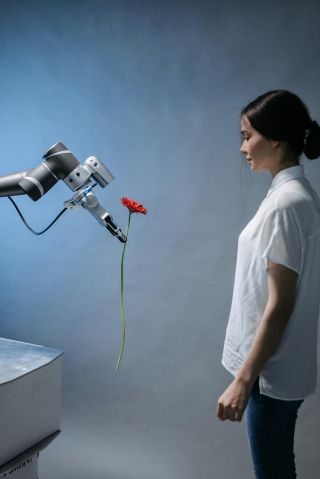Artificial Intelligence
Can We Feel Empathy for AI?
New research shows that our empathy for AI may depend on how human-like it is.
Updated July 12, 2024 Reviewed by Devon Frye
Key points
- Our empathy for AI depends on many factors, such as human likeness, responsiveness, and conceptual metaphors.
- Humans tend to have more empathy for humans than robots or AI agents.
- Empathic design of AI can create more collaboration and connection in human-AI interactions.

A new study has found that people are less able to empathize with robot facial expressions of pain compared to humans in pain. Robots and AI agents can mimic humans in pain but do not have a subjective experience of pain.
Using electrophysiology and functional brain imaging, researchers found that people had greater empathy for the suffering of humans compared to humanlike robots. This is consistent with prior brain imaging research showing that people have more empathy for humans than robots.
Yet humans do demonstrate empathy for robots and AI-powered agents, even though it may not be at the same levels as for other humans. People are hesitant to hurt robots and are inclined to help robots find their way.
However, people have been known to harm robots as well. One example is the "death" of the hitchhiking robot, hitchBOT, which successfully made its way across Canada, Germany, and the Netherlands with the help of strangers but was destroyed when it attempted to hitchhike across the United States.

Other studies have found that children may bully or abuse robots out of curiosity. The act of harming or bullying robots is still perceived as wrong, though people are less likely to intervene. Aggressiveness towards AI is not only directed at robots—people can get angry with and act aggressively toward customer service AI chatbots as well.
Factors That Enhance Our Empathy Toward AI
Our levels of empathy depend on the emotional situation and how AI agents are designed. Our empathy toward AI influences whether we feel AI is trustworthy and dependable. There are several factors that can enhance our empathy for AI.
- Human likeness. Human likeness is the major factor in how much people empathize with robots and AI. The more human-like they appear, the more likely people will empathize with them—up to a point. Mori's uncanny valley theory proposes that people have an increased affinity for things with human likeness, but when robots look nearly identical to humans, this can instead provoke fear and anxiety. Thus, an AI agent or robot that looks too human-like may be perceived as less trustworthy and empathic.
- Emotional expression and mirroring. Expressing human emotions, such as fear and concern about losing one's memory, can provoke more empathy. Humans respond better to robots and AI agents that exhibit empathetic capabilities, such as companionship or caregiving robots, or therapy chatbots.
- Perception of human emotion and social responsiveness. AI agents that can perceive human emotions and adjust their social behavior accordingly enhance empathy. Responsive AI that acknowledges human emotion builds trust and connection.
- Positive metaphors. Metaphors significantly influence how people conceptualize AI agents and affect empath levels toward them. Terms like "assistant," "therapist," "CEO," "companion," "friend," carry different connotations in terms of warmth and competence. This impacts user expectations and experiences.
- Embodiment. Embodied AI integrates AI and robotics, allowing for emotional expression through tone, body language, and movement.
- Agreeableness. AI agents that are perceived as cooperative rather than confrontational tend to foster more connection and reduce anxiety.
- Transparency in roles and functionality. Clear roles and functions of AI agents enhance acceptance. Transparency is crucial for building trust, although excessive technical jargon or information overload can be counterproductive. If AI is perceived as competition or potentially displacing humans, then it will be more likely to cause anxiety and be seen as a threat.
- Oversight and regulation by humans. AI agents with full autonomy may trigger fear and anxiety. Human oversight and regulation, especially in high-risk tasks like medical or military decision-making, are reassuring and facilitate more empathy.
Empathy toward AI is essential for building trust and effective collaboration with AI agents. These factors of empathic design enhance our empathy for AI agents and foster beliefs that AI can be reliable and trustworthy.
Marlynn Wei, MD, PLLC © Copyright 2024. All rights reserved.
References
Wu T, Zheng H, Zheng G, Huo T, Han S. Do we empathize humanoid robots and humans in the same way? Behavioral and multimodal brain imaging investigations. Cereb Cortex. 2024 Jun 4;34(6):bhae248. doi: 10.1093/cercor/bhae248. PMID: 38884282.


